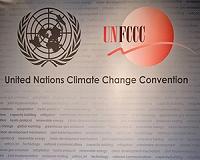| . |  |
. |
Bonn (AFP) June 9, 2010 The UN's incoming chief on climate change cautioned on Wednesday it could take until 2050 to build the machinery that will ultimately tame greenhouse gases. In an interview with newswire reporters on the sidelines of UN talks in Bonn, Christiana Figueres said she was approaching her new job with optimism tempered by hard-edged realism. "I continue to be confident that governments will meet this challenge, for the simple reason that humanity must meet the challenge. We just don't have another option," said Figueres. But, she warned, political progress on climate change would lag behind scientific warnings for many years to come -- and those who expected a quick fix would be disappointed. "I don't believe that we will ever have a final agreement on climate... in my lifetime," she said. "Maybe in yours," the 53-year-old added. Figueres explained: "Building the regime is going to require an effort, a sustained effort of those who will be here, over the next 20 to 30 to 40 years...." "We have to understand that this is an incremental process, this is a gradual process and that whatever we do is not going to be enough, we still have to hold the bar very high." An experienced and highly regarded negotiator for Costa Rica who was educated in Britain and the United States, Figueres takes the helm as executive secretary of the UN Framework Convention on Climate Change (UNFCCC) on July 8. She succeeds Yvo de Boer, a Dutchman, who resigned in the wake of the stormy UN climate summit in Copenhagen last December. The marathon was supposed to deliver a historic pact on greenhouse-gas emissions from 2012 and channel billions to poor countries exposed to worsening drought, floods, storms and rising seas. But it was marred by backbiting and nitpicking, with some 120 attending heads of state and government watching in shock. In the event, a couple of dozen leaders huddled in the night to craft an 11th-hour document, the so-called Copenhagen Accord, in order to save face. Hedged with non-binding promises to hold additional warming to two degrees Celsius (3.6 degrees Fahrenheit), it was savaged by green groups as a fudge, by advocates for the poor as betrayal and by left-leaning Latin American countries as a violation of UN democracy. Figueres upbraided those who would describe the outcome of Copenhagen as a "train wreck." But she acknowledged the meeting had been "full of mistakes, full of errors, from which we are all learning," especially on informing other countries about negotiations taking place in a small group. The Bonn talks, taking place among senior representatives, conclude on Friday after a 12-day effort to make headway on a negotiation blueprint. Developing-country delegates on Wednesday said that trust had been badly damaged at Copenhagen and still had to be restored before the next grand UNFCCC meeting, taking place in Cancun, Mexico, from November 29 to December 10. Some countries are lobbying for a legally-binding deal to be completed in Cancun, but most are quietly admitting this is unrealistic. A better bet would be agreement on some big issues, leading to an overall accord in South Africa in 2011, they say. Figueres refused to be drawn on whether Cancun would deliver the coveted treaty or not. But in any case, she said, Cancun had to be about turning the Copenhagen pledges -- on help for poor countries and preventing deforestation, especially -- into solid action. "If we can't deliver (an agreement) at Cancun and if we are shown the road to Cape Town or any other cities, it will be... a Holocaust," warned Bangladesh negotiator Quamrul Islam Chowdhury, who said his country, threatened by rising seas, was "ground zero" in the onslaught by climate change.
Share This Article With Planet Earth
Related Links Climate Science News - Modeling, Mitigation Adaptation
 Mexico: Don't give up on Cancun
Mexico: Don't give up on CancunBonn, Germany (UPI) Jun 9, 2010 Warnings from representatives from the major economies that the U.N. climate change summit in Cancun won't produce a successful outcome have angered Mexican officials. "It is irresponsible and contrary to common objective to say that we can't achieve something in Cancun," Luis Alfonso de Alba, Mexico's ambassador for climate change, was quoted as saying by India's Economic Times. "The s ... read more |
|
| The content herein, unless otherwise known to be public domain, are Copyright 1995-2010 - SpaceDaily. AFP and UPI Wire Stories are copyright Agence France-Presse and United Press International. ESA Portal Reports are copyright European Space Agency. All NASA sourced material is public domain. Additional copyrights may apply in whole or part to other bona fide parties. Advertising does not imply endorsement,agreement or approval of any opinions, statements or information provided by SpaceDaily on any Web page published or hosted by SpaceDaily. Privacy Statement |